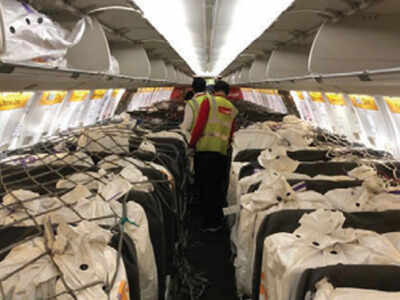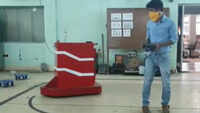
KOLKATA: When captain Sanjay Dabral of SpiceJet flew into Kolkata with a consignment of medicines and ventilators a couple of weeks ago, an air controller greeted him. “You all are doing a great job. Keep it up,” the air traffic control officer (ATCO) told the captain over VHF radio. Last week, IndiGo captain Akash Tiwari got a similar reception while passing over Kolkata in an Airbus A320 aircraft, ferrying medicines and food supplies to the Northeast.
Cargo flights that have played second fiddle to commercial passenger jets are not only ruling the skies now, its pilots are also receiving accolades for transporting critical medical equipment, medicines and food during the pandemic. Around 27 flights have operated to Kolkata since March 25, carrying 2,149 tonnes of cargo into and out of the city. “Pilots of cargo flights have had more conversation with ATCOs in the past month than in years. There is a lot of mutual respect for being on duty,” said Dabral, who has been flying with the airline for 15 years.
Tiwari, who usually flies passengers but is now ferrying cargo, both in the belly and on the seats and overhead cabin racks, said lack of interaction with stewards or passengers during the flight is more than compensated for by the conversations with controllers. “ATCOs have been extremely supportive and encouraging. Not just within the country, but even while flying over Bangladesh, the exchanges have been very pleasant,” he said.
Pilots of Air India special flights to Frankfurt have also reported receiving words of praise and encouragement from Pakistan ATC as did SpiceJet pilots who flew to Hong Kong, Shanghai and elsewhere.
The camaraderie in the air, facilitated by the extra time that ATCOs can now afford with no passenger flights in India and several other counties, has also led to directing routing of flights. Flights from Kolkata to Delhi take 10 minutes less and those to Mumbai 15 minutes, saving 540-800 litres of fuel per trip.
There have been challenges as well, including minimal support of engineers, loaders and ground staff at airports. There were other complications as well, both professional and domestic. “Initially, pilots who operated international flights were being quarantined. This issue was later resolved. Then, families had to be convinced that we needed to fly and were taking adequate precautions. Many housing societies were also objecting to pilots, who lived there, travelling internationally. They have now come around,” said Dabral.
Cargo flights that have played second fiddle to commercial passenger jets are not only ruling the skies now, its pilots are also receiving accolades for transporting critical medical equipment, medicines and food during the pandemic. Around 27 flights have operated to Kolkata since March 25, carrying 2,149 tonnes of cargo into and out of the city. “Pilots of cargo flights have had more conversation with ATCOs in the past month than in years. There is a lot of mutual respect for being on duty,” said Dabral, who has been flying with the airline for 15 years.
Tiwari, who usually flies passengers but is now ferrying cargo, both in the belly and on the seats and overhead cabin racks, said lack of interaction with stewards or passengers during the flight is more than compensated for by the conversations with controllers. “ATCOs have been extremely supportive and encouraging. Not just within the country, but even while flying over Bangladesh, the exchanges have been very pleasant,” he said.
Pilots of Air India special flights to Frankfurt have also reported receiving words of praise and encouragement from Pakistan ATC as did SpiceJet pilots who flew to Hong Kong, Shanghai and elsewhere.
The camaraderie in the air, facilitated by the extra time that ATCOs can now afford with no passenger flights in India and several other counties, has also led to directing routing of flights. Flights from Kolkata to Delhi take 10 minutes less and those to Mumbai 15 minutes, saving 540-800 litres of fuel per trip.
There have been challenges as well, including minimal support of engineers, loaders and ground staff at airports. There were other complications as well, both professional and domestic. “Initially, pilots who operated international flights were being quarantined. This issue was later resolved. Then, families had to be convinced that we needed to fly and were taking adequate precautions. Many housing societies were also objecting to pilots, who lived there, travelling internationally. They have now come around,” said Dabral.

Coronavirus outbreak
Trending Topics
LATEST VIDEOS
More from TOI
Navbharat Times
Featured Today in Travel
Get the app









